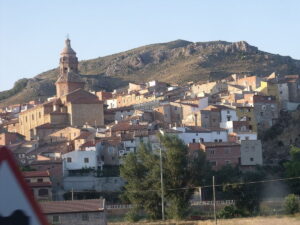Digital nomads are here to save Spain’s ghost towns

Dozens of villages across Spain are in terminal decline. A new visa scheme aimed at digital nomads could revive them
How do you save a dying village?
For the small community of Oliete the answer was olive oil. In May 2014 the local community started ApadrinaUnOlivo.org – adopt an olive tree, in Spanish – to allow anyone in the world to sponsor an abandoned tree for €50. The money raised has been used to fund an NGO that has created thirteen jobs for people in the village. In return, sponsors get two litres of olive oil per year and, hopefully, forge a bond with the village.
To date some 7,000 people have sponsored a tree, with many visiting to find out more about life in Oliete. New arrivals to the village have even saved the school from closing – raising the student population from four when the project started to 13 today. But with a population of just 343, Oliete is still in terminal decline.
Back in 1910, the village was home to 2,533 people and had two cinemas and two dance halls. Now all is quiet. But that could be about to change.
Oliete, like 30 other dying villages across Spain, has joined the National Network of Welcoming Villages for Remote Workers scheme, or Red Nacional de Pueblos Acogedores para el Teletrabajo, which aims to attract foreign workers with a new 12-month work visa for digital nomads.
Spain’s draft Startup Act, which was passed by the cabinet in July but has yet to receive parliamentary approval, aims to encourage digital nomads to repopulate rural villages. Among Spain’s 8,131 municipalities, 3,403 are classed as at risk of dying out, according to the country’s National Statistics Institute. The digital nomad visa will be available from Spanish consulates around the world for workers from outside the European Union. And, once a person is living and working in Spain, they can apply for a residence permit to extend their stay for two years, which can then be renewed for a further two years.
Like other countries which have introduced nomad visas, Spain wants to lure foreign workers with tax incentives. They can pay the Spanish non-resident tax rate of 24 per cent on incomes of up to €600,000. By comparison, Spanish residential tax rates vary but can be as high as 45 per cent for top earners and along with the increase in the local population the hope is the empty properties start to be owner occupied bringing life back into the local property market and communities.
If you are looking for a mortgage in Spain, France, Portugal, Turkey or USA email mark@vci-network.com
Click here to subscribe to the Viva Costa Newsletter
www.vivacostainternational.com
VIP SERVICE
Looking for help to find that special luxury dream home?
Are you too busy, don’t have not enough time on your hands? Are you a lifestyle consultant for clients who need your services to find them a luxury property?
Let us contact all our real estate agents in the country that you require and get the best selection of luxury properties sent directly to you.
Simply fill in your requirements in the form and let us do the work for you.
OUR SOCIAL MEDIA
Expose your properties to millions of visitors via our social media networks
When you list with Million Euro Listings, your properties are automatically promoted on all social networks with no extra cost to you!
Follow us on our social media networks…
Blog : Digital nomads are here to save Spain’s ghost towns
















